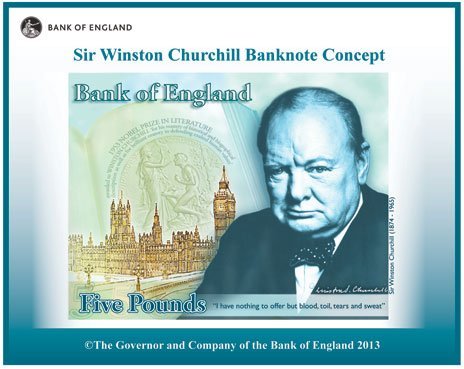Sir Winston Churchill to feature on new £5 banknote

 The Bank of England has announced that former prime minister Sir Winston Churchill (1874-1965) will feature on the new 5 pound banknote. Bank of England Governor, Sir Mervyn King, made the announcement, and revealed the image of Churchill which will be used, to members of the Churchill family at Chartwell, Churchill’s former home. Churchill will replace the current face of the 5 pound note, social reformer Elizabeth Fry who has been on the banknote since 2002.
The Bank of England has announced that former prime minister Sir Winston Churchill (1874-1965) will feature on the new 5 pound banknote. Bank of England Governor, Sir Mervyn King, made the announcement, and revealed the image of Churchill which will be used, to members of the Churchill family at Chartwell, Churchill’s former home. Churchill will replace the current face of the 5 pound note, social reformer Elizabeth Fry who has been on the banknote since 2002.
Commenting on the choice, the Governor said: "Our banknotes acknowledge the life and work of great Britons. Sir Winston Churchill was a truly great British leader, orator and writer. Above that, he remains a hero of the entire free world. His energy, courage, eloquence, wit and public service are an inspiration to us all. I am proud to announce that he will appear on our next banknote."
The plan is for the Churchill note to be issued as a £5 note, and that it shall be issued during 2016; but those choices may be reviewed as plans for issuing the new note are finalised. Features of the design on the reverse of the note will include:
- A portrait of Winston Churchill from a photograph taken in Ottawa by Yousuf Karsh on 30 December 1941.
- A view of Westminster and the Elizabeth Tower from the South Bank looking across Westminster Bridge, acknowledging that for almost sixty years Westminster was Churchill’s life.
- The image of the Elizabeth Tower with the hands of the Great Clock at 3 o’clock – the approximate time on 13 May 1940 when Sir Winston Churchill declared in a speech to the House of Commons: "I have nothing to offer but blood, toil, tears and sweat." This declaration is quoted beneath the portrait.
- A background image of the Nobel Prize medal which he was awarded in 1953 for literature, together with the wording of the prize citation. Churchill was awarded the Nobel prize for literature ‘for his mastery of historical and biographical description as well as for brilliant oratory in defending exalted human values’. Although Churchill was a prolific writer, the Nobel prize acknowledged the power and effect of his inspirational oratory as much as the quality of his literary output which ranged from journalism to works of academic standing. His writings include The Second World War (1948-53) and A History of the English Speaking Peoples (1956-8).

A short bio on Winston Churchill (yes, he is somewhat of a hero to me, so forgive this lengthy article):
After an early career as a soldier and war correspondent, Churchill was elected as a Conservative MP in 1901, but joined the Liberals after the Conservative Party split over free trade. Having served as President of the Board of Trade, Home Secretary, and First Lord of the Admiralty where he helped modernise the navy, he returned to the army, serving on the Western Front, in 1916. Back in Parliament in 1924, he served as Chancellor of the Exchequer in Stanley Baldwin’s Conservative government. After the fall of the government in 1929 he did not hold office for a decade, his so-called 'Wilderness Years'. He warned of the threat of German re-armament and returned to public life as First Lord of the Admiralty on the outbreak of the Second World War.
In May 1940 he became Prime Minister, replacing Neville Chamberlain and leading the newly-formed National Government. In his first speech to the new Administration he declared: "I have nothing to offer but blood, toil, tears and sweat." And concluded with: "Come then, let us go forward together with our united strength." Both are examples of the brilliance of his oratory. Winston Churchill became a patriotic icon, exemplar of leadership and a national inspiration during the Second World War. Defeated in the post-victory 1945 general election, he argued strongly for Western unity against the threat of Communism. He was returned to office in 1951 and finally retired in 1955, aged 80.
Churchill’s leadership qualities earned him a vast international following, especially in the United States where he was given the singular honour of being granted honorary US citizenship (in 1963) and in 1999 became the first Briton to have a US warship named after him. He has been portrayed on the postage stamps of 150 nations.
Chartwell, the family home in Kent, which he purchased in 1922, was where he was able to relax and enjoy family life and the company of friends. It was there that his lifelong love of the land and animals found fulfilment on his smallholding, which included goats, pigs, birds and butterflies. His other interests ranged from painting to bricklaying, but it was writing which provided the constant thread throughout his life and a source of income. In 1953 he was awarded the Nobel prize for literature.
In the course of his lifetime Churchill received thirty-seven orders, decorations and medals including Companion of Honour (1922), Order of Merit (1946), and Order of the Garter (1953). He died on 24 January 1965 and was given a state funeral, the first commoner to be so honoured since Gladstone in 1898. He was also the first commoner to be portrayed on a British coin – the 1965 crown or five shilling piece.










Geen reacties